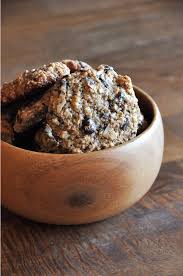Delicious Almond and Coconut Flour Cookies
Looking for a gluten-free and flavorful cookie option? Try baking almond and coconut flour cookies! These cookies are not only delicious but also offer a unique texture and nutty flavor that will leave you craving for more.
Ingredients:
- 1 cup almond flour
- 1/2 cup coconut flour
- 1/2 cup coconut oil, melted
- 1/3 cup honey or maple syrup
- 1 teaspoon vanilla extract
- 1/4 teaspoon salt
- Optional add-ins: chocolate chips, chopped nuts, dried fruits
Instructions:
- Preheat your oven to 350°F (180°C) and line a baking sheet with parchment paper.
- In a mixing bowl, combine the almond flour, coconut flour, melted coconut oil, honey or maple syrup, vanilla extract, and salt. Mix well until a dough forms.
- If desired, fold in your favorite add-ins such as chocolate chips, chopped nuts, or dried fruits.
- Scoop tablespoon-sized portions of the dough onto the prepared baking sheet, leaving some space between each cookie.
- Gently flatten each cookie with the back of a spoon or your fingers.
- Bake in the preheated oven for 12-15 minutes or until the edges are golden brown.
- Allow the cookies to cool on the baking sheet for a few minutes before transferring them to a wire rack to cool completely.
These almond and coconut flour cookies are perfect for anyone looking for a healthier cookie option without sacrificing taste. Enjoy them with a glass of milk or your favorite hot beverage for a delightful treat any time of day!
Crumbly Conundrums & Flour Fusions: Mastering Almond and Coconut Flour Cookies – FAQs Unveiled
- Why do my coconut flour cookies fall apart?
- Can I mix coconut flour and almond flour together?
- Is almond flour or coconut flour better for cookies?
- Which is healthier almond or coconut flour?
Why do my coconut flour cookies fall apart?
When coconut flour cookies fall apart, it is often due to the unique properties of coconut flour itself. Coconut flour is highly absorbent and requires more liquid than traditional wheat flour. If your coconut flour cookies are dry and crumbly, it may be because the dough lacks sufficient moisture to bind the ingredients together. To prevent this issue, try increasing the amount of wet ingredients such as eggs, oil, or sweeteners in your recipe. Additionally, letting the dough rest for a few minutes before shaping and baking can help the coconut flour fully absorb the liquids and create a more cohesive cookie texture. Experimenting with different ratios of ingredients and following recipes specifically designed for coconut flour can also help you achieve perfectly tender and delicious cookies that hold together beautifully.
Can I mix coconut flour and almond flour together?
When it comes to baking almond and coconut flour cookies, a common question that arises is whether you can mix coconut flour and almond flour together. The answer is yes! Combining these two flours can actually yield a great texture and flavor profile for your cookies. Almond flour provides a nutty taste and moist texture, while coconut flour adds a subtle sweetness and lightness to the cookies. By blending these two flours in the right proportions, you can create delicious gluten-free cookies that are both flavorful and satisfying. Just be mindful of the ratios to achieve the desired consistency in your cookie dough.
Is almond flour or coconut flour better for cookies?
When it comes to choosing between almond flour and coconut flour for cookies, it ultimately depends on your dietary preferences and desired texture. Almond flour is known for its nutty flavor and moist, chewy texture, making it a great option for soft-baked cookies. On the other hand, coconut flour is lighter and absorbs more liquid, resulting in a drier and crumblier cookie. If you prefer a denser, richer cookie, almond flour may be the better choice. However, if you’re looking for a lighter, more delicate cookie with a subtle coconut flavor, coconut flour could be the way to go. Experimenting with both flours or even combining them can lead to deliciously unique cookie creations tailored to your taste preferences.
Which is healthier almond or coconut flour?
When comparing almond and coconut flour in terms of health benefits, both offer unique advantages. Almond flour is higher in protein and healthy fats, making it a good source of energy and promoting satiety. On the other hand, coconut flour is rich in fiber, which can aid digestion and promote a feeling of fullness. While almond flour provides more essential nutrients like vitamin E and magnesium, coconut flour is lower in carbohydrates, making it a suitable option for those following a low-carb diet. Ultimately, the choice between almond and coconut flour depends on individual dietary preferences and nutritional needs. Incorporating both types of flour into your baking repertoire can offer a diverse range of nutrients and flavors to your diet.
Tags: almond and coconut flour cookies, almond flour, baking, coconut flour, coconut oil, cookies, dough, flavor, gluten-free, honey, ingredients, maple syrup, moist, recipe, salt, texture, vanilla extract
